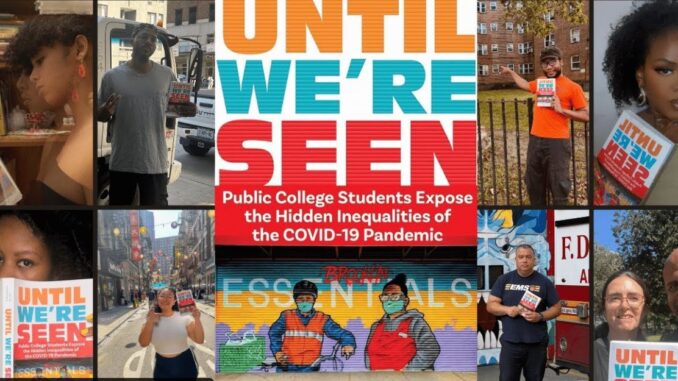
By T’Neil Gooden
Students and faculty of Brooklyn College came together to tell the stories of those who disproportionately faced inequality as a result of COVID-19 on Oct. 24. Hosted by the Wolfe Institute, the event was to discuss “Until We’re Seen” by Professor Joseph Entin, Professor Jeanne Theoharis, and Dominick Braswell, which features a variety of voices from students within the BC community.
In this work, they combined forces to allow students to put what they have witnessed and experienced into the narrative. Until We’re Seen consists of 16 student-written stories based on the impacts of COVID-19 in their communities and the imbalance they faced during that time in their everyday lives. Students contributed to over ten chapters of the book. Each chapter explains the livelihoods, relationships, and losses these students witnessed during the pandemic.
“These are not single-issue stories, but complex, multifaceted chronicles of multi-racial, working-class life power and brilliance,” Entin told the audience. “These stories are a testament to the power of CUNY students.”
Students who contributed to the book were able to tell the audience about the motivation that kept them wanting to add more to the experiences they saw in their communities.
Dominick Braswell, a graduate of BC, wrote Chapter 13 of “Until We’re Seen.” He focused on the doubling of residents to New York City Housing Authority (NYCHA) housing during the pandemic, and the effects that change had within the Brooklyn community.
“I frame my chapter around the community and how the pandemic disputed how we, as Crown Heights and Albany houses, build a community with one another,” Braswell told the audience. “It was important for me to frame it through this because the 50-plus years of public discourse about life in public housing, coming from the media, elected officials, as well as some scholars, has left the general public with an image of the projects that are more like dystopian war zones than communities of people who care about each other’s well-being.”
To some of the students, writing about their experiences was an outlet to express what they went through.
“My piece was more raw and real because you’re living it at the time and it’s hard to be vulnerable in a time where this is my real reality,” Tania Darbouze, writer of chapter three titled “Double Jeopardy,” told the audience.
Student writers used research about their communities to provide evidence of the impacts people had been seeing during the pandemic. They were also workers during the pandemic and had first-hand experiences with the lives of a plethora of people, often seeing many being mistreated.
“We are the ones that we have been waiting for, nobody is going to save us,” Anthony Almojera, author of Chapter 11 and an EMS worker, told the audience. “It’s up to us to change [health services] because it has to change, it can’t go on like this. This is not what life is.”
As BC students finished speaking about the chapters they had written and why they wrote about their communities, the conversation pivoted to students from California State University (CSU), who added their knowledge to this book by speaking about the gender, sexuality, and inequality that happened in Los Angeles, California. Alejandra Marchevsky, a professor from CSU, came to the event to speak on behalf of the students who had authored some of the chapter, and the meaning behind speaking about gender inequalities and the effects of COVID-19 in places like Los Angeles.
“The pandemic was a story of global inequality,” Marchevsky told the audience.
Marchevsky continued to explain the imbalances that occurred between documented and undocumented citizens during the pandemic. When the state failed to take care of its citizens, women, non-binary people, and queer individuals were the people who stepped up and took care of their families. Many writers followed Marchebsky, touching upon the differences and inequalities that occur through the education system.
“This project speaks to the power of what these students, these young people, these incredible researchers did in terms of making us see things that maybe we weren’t comfortable with seeing but need to see,” Theoharis said.
Students interested in reading “Until We’re Seen” can access it for free in the CUNY library or purchase it online from Pennsylvania Press.
